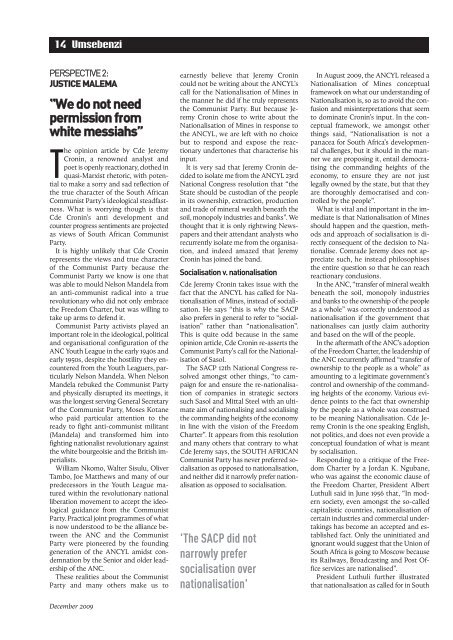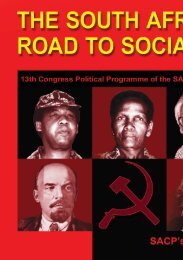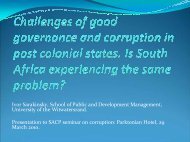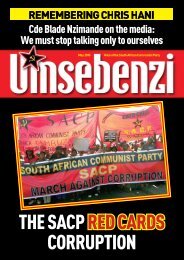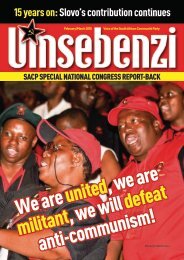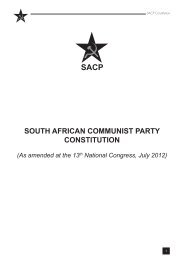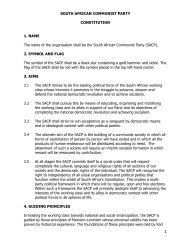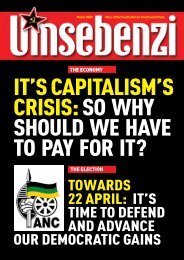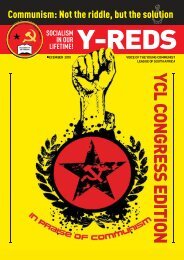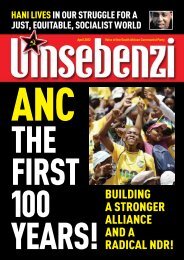Forward to Socialism!! - South African Communist Party
Forward to Socialism!! - South African Communist Party
Forward to Socialism!! - South African Communist Party
Create successful ePaper yourself
Turn your PDF publications into a flip-book with our unique Google optimized e-Paper software.
14 Umsebenzi<br />
PERSPECTIVE 2:<br />
JUSTICE MALEMA<br />
“We do not need<br />
permission from<br />
white messiahs”<br />
The opinion article by Cde Jeremy<br />
Cronin, a renowned analyst and<br />
poet is openly reactionary, clothed in<br />
quasi-Marxist rhe<strong>to</strong>ric, with potential<br />
<strong>to</strong> make a sorry and sad reflection of<br />
the true character of the <strong>South</strong> <strong>African</strong><br />
<strong>Communist</strong> <strong>Party</strong>’s ideological steadfastness.<br />
What is worrying though is that<br />
Cde Cronin’s anti development and<br />
counter progress sentiments are projected<br />
as views of <strong>South</strong> <strong>African</strong> <strong>Communist</strong><br />
<strong>Party</strong>.<br />
It is highly unlikely that Cde Cronin<br />
represents the views and true character<br />
of the <strong>Communist</strong> <strong>Party</strong> because the<br />
<strong>Communist</strong> <strong>Party</strong> we know is one that<br />
was able <strong>to</strong> mould Nelson Mandela from<br />
an anti-communist radical in<strong>to</strong> a true<br />
revolutionary who did not only embrace<br />
the Freedom Charter, but was willing <strong>to</strong><br />
take up arms <strong>to</strong> defend it.<br />
<strong>Communist</strong> <strong>Party</strong> activists played an<br />
important role in the ideological, political<br />
and organisational configuration of the<br />
ANC Youth League in the early 1940s and<br />
early 1950s, despite the hostility they encountered<br />
from the Youth Leaguers, particularly<br />
Nelson Mandela. When Nelson<br />
Mandela rebuked the <strong>Communist</strong> <strong>Party</strong><br />
and physically disrupted its meetings, it<br />
was the longest serving General Secretary<br />
of the <strong>Communist</strong> <strong>Party</strong>, Moses Kotane<br />
who paid particular attention <strong>to</strong> the<br />
ready <strong>to</strong> fight anti-communist militant<br />
(Mandela) and transformed him in<strong>to</strong><br />
fighting nationalist revolutionary against<br />
the white bourgeoisie and the British imperialists.<br />
William Nkomo, Walter Sisulu, Oliver<br />
Tambo, Joe Matthews and many of our<br />
predecessors in the Youth League matured<br />
within the revolutionary national<br />
liberation movement <strong>to</strong> accept the ideological<br />
guidance from the <strong>Communist</strong><br />
<strong>Party</strong>. Practical joint programmes of what<br />
is now unders<strong>to</strong>od <strong>to</strong> be the alliance between<br />
the ANC and the <strong>Communist</strong><br />
<strong>Party</strong> were pioneered by the founding<br />
generation of the ANCYL amidst condemnation<br />
by the Senior and older leadership<br />
of the ANC.<br />
These realities about the <strong>Communist</strong><br />
<strong>Party</strong> and many others make us <strong>to</strong><br />
earnestly believe that Jeremy Cronin<br />
could not be writing about the ANCYL’s<br />
call for the Nationalisation of Mines in<br />
the manner he did if he truly represents<br />
the <strong>Communist</strong> <strong>Party</strong>. But because Jeremy<br />
Cronin chose <strong>to</strong> write about the<br />
Nationalisation of Mines in response <strong>to</strong><br />
the ANCYL, we are left with no choice<br />
but <strong>to</strong> respond and expose the reactionary<br />
under<strong>to</strong>nes that characterise his<br />
input.<br />
It is very sad that Jeremy Cronin decided<br />
<strong>to</strong> isolate me from the ANCYL 23rd<br />
National Congress resolution that “the<br />
State should be cus<strong>to</strong>dian of the people<br />
in its ownership, extraction, production<br />
and trade of mineral wealth beneath the<br />
soil, monopoly industries and banks”. We<br />
thought that it is only rightwing Newspapers<br />
and their attendant analysts who<br />
recurrently isolate me from the organisation,<br />
and indeed amazed that Jeremy<br />
Cronin has joined the band.<br />
Socialisation v. nationalisation<br />
Cde Jeremy Cronin takes issue with the<br />
fact that the ANCYL has called for Nationalisation<br />
of Mines, instead of socialisation.<br />
He says “this is why the SACP<br />
also prefers in general <strong>to</strong> refer <strong>to</strong> “socialisation”<br />
rather than “nationalisation”.<br />
This is quite odd because in the same<br />
opinion article, Cde Cronin re-asserts the<br />
<strong>Communist</strong> <strong>Party</strong>’s call for the Nationalisation<br />
of Sasol.<br />
The SACP 12th National Congress resolved<br />
amongst other things, “<strong>to</strong> campaign<br />
for and ensure the re-nationalisation<br />
of companies in strategic sec<strong>to</strong>rs<br />
such Sasol and Mittal Steel with an ultimate<br />
aim of nationalising and socialising<br />
the commanding heights of the economy<br />
in line with the vision of the Freedom<br />
Charter”. It appears from this resolution<br />
and many others that contrary <strong>to</strong> what<br />
Cde Jeremy says, the SOUTH AFRICAN<br />
<strong>Communist</strong> <strong>Party</strong> has never preferred socialisation<br />
as opposed <strong>to</strong> nationalisation,<br />
and neither did it narrowly prefer nationalisation<br />
as opposed <strong>to</strong> socialisation.<br />
'The SACP did not<br />
narrowly prefer<br />
socialisation over<br />
nationalisation'<br />
In August 2009, the ANCYL released a<br />
Nationalisation of Mines conceptual<br />
framework on what our understanding of<br />
Nationalisation is, so as <strong>to</strong> avoid the confusion<br />
and misinterpretations that seem<br />
<strong>to</strong> dominate Cronin’s input. In the conceptual<br />
framework, we amongst other<br />
things said, “Nationalisation is not a<br />
panacea for <strong>South</strong> Africa’s developmental<br />
challenges, but it should in the manner<br />
we are proposing it, entail democratising<br />
the commanding heights of the<br />
economy, <strong>to</strong> ensure they are not just<br />
legally owned by the state, but that they<br />
are thoroughly democratised and controlled<br />
by the people”.<br />
What is vital and important in the immediate<br />
is that Nationalisation of Mines<br />
should happen and the question, methods<br />
and approach of socialisation is directly<br />
consequent of the decision <strong>to</strong> Nationalise.<br />
Comrade Jeremy does not appreciate<br />
such, he instead philosophises<br />
the entire question so that he can reach<br />
reactionary conclusions.<br />
In the ANC, “transfer of mineral wealth<br />
beneath the soil, monopoly industries<br />
and banks <strong>to</strong> the ownership of the people<br />
as a whole” was correctly unders<strong>to</strong>od as<br />
nationalisation if the government that<br />
nationalises can justly claim authority<br />
and based on the will of the people.<br />
In the aftermath of the ANC’s adoption<br />
of the Freedom Charter, the leadership of<br />
the ANC recurrently affirmed “transfer of<br />
ownership <strong>to</strong> the people as a whole” as<br />
amounting <strong>to</strong> a legitimate government’s<br />
control and ownership of the commanding<br />
heights of the economy. Various evidence<br />
points <strong>to</strong> the fact that ownership<br />
by the people as a whole was construed<br />
<strong>to</strong> be meaning Nationalisation. Cde Jeremy<br />
Cronin is the one speaking English,<br />
not politics, and does not even provide a<br />
conceptual foundation of what is meant<br />
by socialisation.<br />
Responding <strong>to</strong> a critique of the Freedom<br />
Charter by a Jordan K. Ngubane,<br />
who was against the economic clause of<br />
the Freedom Charter, President Albert<br />
Luthuli said in June 1956 that, “In modern<br />
society, even amongst the so-called<br />
capitalistic countries, nationalisation of<br />
certain industries and commercial undertakings<br />
has become an accepted and established<br />
fact. Only the uninitiated and<br />
ignorant would suggest that the Union of<br />
<strong>South</strong> Africa is going <strong>to</strong> Moscow because<br />
its Railways, Broadcasting and Post Office<br />
services are nationalised”.<br />
President Luthuli further illustrated<br />
that nationalisation as called for in <strong>South</strong><br />
December 2009


